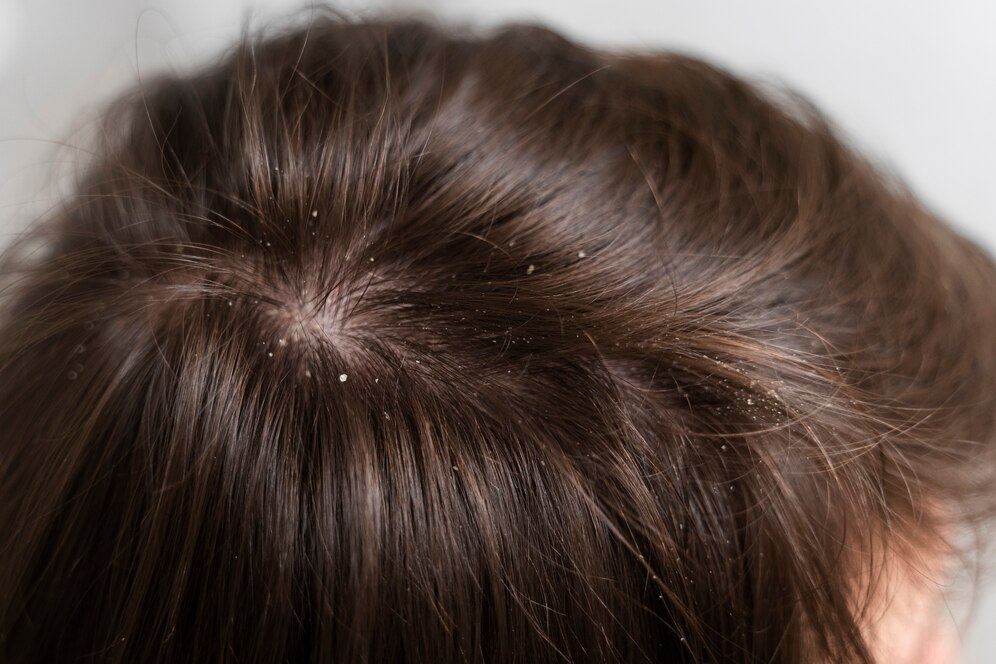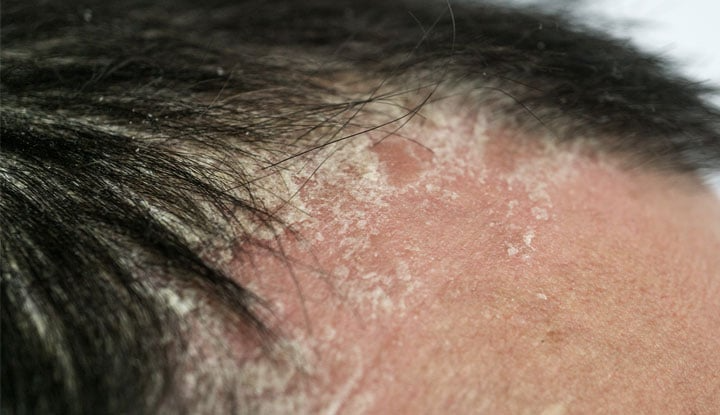
Table of Contents
What Is Scalp Psoriasis? It’s Causes, Symptoms, Treatment Options
Are you curious about what you can do to deal with the scaly, itchy patches on your scalp? Do you continuously ask, ‘Why is my scalp so itchy‘? Do not worry. You may have developed scalp psoriasis.
There are treatments available for the condition that you may be dealing with. Psoriasis is an autoimmune disease that has no known cure. However, inflammatory skin patches can be managed.
Scalp psoriasis is a common health condition that can appear at any time in your life, irrespective of how much hair hygiene you maintain. It generally occurs when you are low on immunity.
Keep reading to learn more about the condition and for a guide to treating and managing scalp psoriasis.
What is Scalp Psoriasis?
Psoriasis is a skin-inflammatory condition and is thought to impact 2.2% of adult people. Psoriasis in children can begin before one year of age and peak between the ages of five and eight.
Itchy, scaly pimples appear on the skin in cases of psoriasis. It looks like red, scaling, slightly elevated spots called papules that eventually combine to create scales.
There could be a hereditary component to psoriasis in some people. The impacted genes appear to have something to do with immune system regulation.
Although it can affect any area of the skin, psoriasis typically manifests itself on the elbows and knees. For many, the damaged scalp is also a defining feature. Like psoriasis elsewhere on the body, scalp psoriasis also causes excessive scaling and itching.
Hair loss on the scalp due to severe psoriasis on the scalp typically grows back if the condition is managed. When the scalp has enough hair on it to prevent topical treatments from being applied, treating scalp psoriasis can be challenging.
Who Does Scalp Psoriasis Affect?
About 45 to 56 per cent of people with psoriasis also have scalp psoriasis, which makes it a relatively common illness. Scalp psoriasis may be inherited. Several factors increase one’s chances of developing such a condition, including:
- Genetics: Scalp psoriasis has a genetic link, just like many other illnesses. You may be at higher risk if you have family members who have the condition.
- The immune system: A too-active immune system may be involved. Scalp psoriasis can result from your immune system mistakenly attacking healthy skin cells when it goes into overdrive.
- Stress: Stress appears to be a prevalent element in many health disorders, and life can be chaotic at times. Stressful periods may cause a flare-up or worsening of scalp psoriasis.
- Environmental Triggers: The presence of certain environmental elements, such as dry, chilly weather, can be a factor. It seems as though your scalp responds to its environment.
- Infections: Infections can occasionally serve as a catalyst. Your risk of acquiring psoriasis may rise if you have ever had an infection on your scalp.
Symptoms and Signs of Scalp Psoriasis
The following are the most common symptoms of scalp psoriasis:
- Red patches on the scalp:There are some hardly perceptible areas. Additionally, patches may be dense, inflammatory, and highly visible.
- Flaking that resembles dandruff:The appearance of scalp psoriasiscan resemble dandruff. Psoriasis on the scalp frequently causes Flaking. However, dandruff and scalp psoriasis are not the same thing. Scalp psoriasis, in contrast to dandruff, results in a silvery sheen and dry scaling on the scalp.
- Dryness on the scalp:The scalp can get so dry that it breaks and bleeds.
- Itchiness in the scalp:Among the most typical symptoms is this one. Some people only have a slight itching, while others experience severe itching that can disrupt daily activities and lead to insomnia.
- Bleeding scalp: Nearly everyone scratches because scalp psoriasiscan be quite itchy. Scratching may cause bleeding on the scalp. Additionally, scratching often makes psoriasis worse. The patches may become thicker and larger after scratching. Dermatologists advise their patients not to scratch their scalp for this reason.
- Soreness and burning sensation:Burning of the scalp is possible. It can hurt a great deal.
- Abrupt hair loss: Hair lossmay result from scratching the scalp or from employing force to remove the scales. Hair often grows back once the psoriasis on the scalp subsides.
These signs and symptoms are recurring. While some just have one minor flare, others experience frequent flare-ups, minor or severe. An explosion can be brought on by a variety of factors, such as dry air, cold, and stress.
What Causes Scalp Psoriasis?
Regardless of where it starts, psoriasis always has the same cause. It appears when an individual’s immune system goes awry and instructs skin cells to increase excessively. Unlike weeks, new skin cells form in a matter of days.
Not one of these extra skin cells is lost by the body. Scalp psoriasis patches develop when skin cells accumulate on the skin’s surface. The redness and Flaking on the scalp are the results of this process.
Scalp Psoriasis vs Dandruff
Typical scalp disorders include seborrheic dermatitis (dandruff) and scalp psoriasis. They also have specific symptoms in common, such as scaly, inflammatory skin.
The majority of the time, psoriasis scales appear drier and thicker than seborrheic dermatitis scales. Psoriasis usually spreads past the hairline. Furthermore, psoriasis typically affects multiple body parts. You might also have minor psoriasis on your elbows, knees, or lower back if you have scalp psoriasis. Alterations to your nails, like pitting, may also be noticed.

Comparing the signs and symptoms
- Psoriasis on the scalp
- Skin inflammation accompanied by scales, which are greasy, crusty areas covered in scales
- Patches that itch and may grow past the hairline or develop on different body sections
- Scalp dermatitis caused by seborrhea
- Scale- or crust-covered areas of inflamed skin
- Dandruff is the term for skin flakes on the hair and scalp.
- Itching
Treatments for scalp psoriasis and seborrheic dermatitis are similar in that they involve medicated shampoos and corticosteroid creams. Treatment for scalp psoriasis is more challenging and frequently protracted than for seborrheic dermatitis of the scalp. To help manage psoriasis, additional therapies, including light therapy, could be required.
Preventing Scalp Psoriasis Flares
Flare-ups of scalp psoriasis can be avoided by maintaining skin hydration with a humidifier. It is best to avoid dry, chilly weather, as it can exacerbate pre-existing conditions.
Breathing techniques and yoga are effective stress-reduction techniques that can reduce anxiety and indirectly impact this illness. Avoid medications such as lithium and quinidine if you are prone to developing psoriasis on your scalp.
There is a large selection of medicated shampoos for scalp psoriasis on the market. A few natural therapies, however, help lessen redness, peeling, and other symptoms.
Apple cider vinegar, which is typically used as a preservative, can also be used to relieve itching. Inflammation can be fought off by culinary additions like turmeric and omega-3 fatty acids.
The symptoms may be reduced by applying aloe vera gel to the affected regions and spending some time in the sun.
It’s advised to follow up and visit the dermatologist frequently. Maintaining a customized treatment plan might prevent the condition from getting worse.
Treatments for Scalp Psoriasis
It is best to consult a board-certified dermatologist for advice on scalp psoriasis therapy if you have the condition. Depending on how bad your psoriasis is, your specific approach will change.
Topical medicines and good skin care are usually the first steps in the treatment process. You could also need to add in other drugs, depending on how bad your symptoms are.
The following list of therapies can help with scalp psoriasis:
- Medicine is given straight to the scalp.
- Medicated shampoos target dry and irritated scalps.
- Laser treatments like excimer laser
- In some cases, patients with really severe scalp psoriasis or psoriatic arthritis require medication in the form of tablets, injections, or infusions. However, they are not the only standard therapies for psoriasis on the scalp.
Tips for Managing Scalp Psoriasis
Although having scalp psoriasis can be difficult, you can effectively control your symptoms and take advantage of improved scalp health with a few valuable recommendations and a proactive attitude toward self-care.
These helpful hints will assist you in managing your scalp psoriasis:
∙ Refrain from scratching your scalp: It’s essential to fight the impulse to scratch your scalp, no matter how badly it itches. It is possible for scratches to aggravate inflammation, start bleeding, or even make you infected.
∙ Handle your scalp with care: Be patient when washing or brushing your hair to avoid breaking it off and aggravating your scalp.
∙ Select the appropriate hair care items: Choose mild, scent-free shampoos and conditioners made especially for delicate scalps.
∙ Keep the scalp hydrated: Moisturize your scalp with a conditioning oil or oil to keep it moisturized. This may lessen scaling and Dryness.
∙ Shield your scalp from the sun: For some people, excessive sun exposure might exacerbate the symptoms of scalp psoriasis, whereas moderate sun exposure may relieve some people’s symptoms.
∙ Reduce stress: It’s critical to learn efficient stress management techniques because stress can either cause or exacerbate psoriasis symptoms.
∙ Continue living a healthy lifestyle: Sticking to a diet full of fruits, vegetables, whole grains, lean meats, and other nutrients in moderation might improve general health and possibly even lower inflammation.
Speak with your hair care professional: Keep your dermatologist or other healthcare practitioner informed about any changes in your condition, your symptoms, and the success of your treatment regimen on a regular basis.
Summary
Although scalp psoriasis can be a complex and persistent condition, it is possible to effectively manage symptoms and maintain a healthy, nourished scalp with a proactive approach to therapy and self-care.
You may take charge of your illness and lessen flare-ups by being aware of the causes and symptoms of scalp psoriasis, consulting a doctor, and using a variety of therapies, special shampoos, and home remedies.